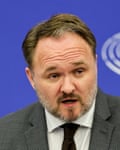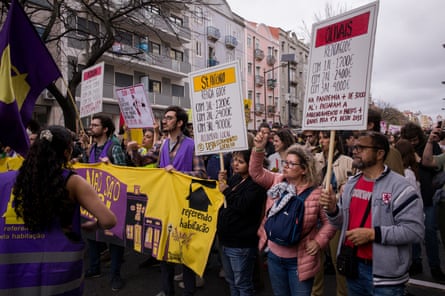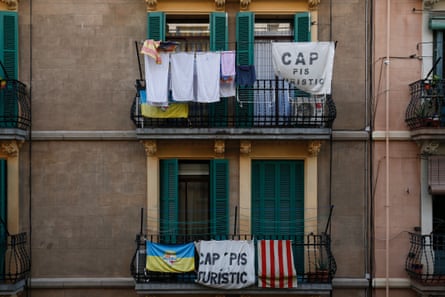The EU executive will propose rules to tackle the “huge problem” of short-term rentals via platforms such as Airbnb and Booking.com, as it seeks to confront the “social crisis” of people struggling to afford a home, its first-ever housing commissioner has said.
In an interview with the Guardian and other European newspapers, Dan Jørgensen said it was time for Brussels policymakers to take housing seriously or cede ground to anti-EU populists, who, he said, did not have the answers to the shortage of affordable homes.

“If we don’t, as policymakers, take this problem seriously and acknowledge that this is a social problem and needs action, then … the anti-EU populists will win,” he said, adding that Brussels had so far “failed to deliver” on some of the key elements of the housing crisis.
Jørgensen, a Danish Social Democrat, has been tasked with crafting the EU’s first-ever affordable housing plan, which is expected to be made public in December. He said publication had been brought forward from 2026, citing the urgency of “the social crisis”.
Brussels has traditionally stayed out of housing policy, but Jørgensen insisted it was a matter for the EU. “The upcoming housing plan will cover areas where it is indeed very clear that [housing] is a European competence and where we have failed to deliver so far … One of those areas is short-term rentals, where we do need more European rules,” he said.

Short-term accommodation, rented via Airbnb and other websites, has boomed across European cities in recent years and been blamed for driving up rents, forcing local people out of historic centres, and turning residential neighbourhoods into tourist zones. Jørgensen said short-term rentals were “a huge problem in many cities” but did not name specific websites or detail any proposals.
Concerns about short-term rentals have come against the backdrop of a general increase in rents and mortgages. Between 2010 and 2023, house prices in the EU increased by 48% and rents by 22% at a time when inflation grew 36%, according to the EU statistics agency Eurostat. Some renters and would-be buyers saw much steeper increases: during the same period, rents in Estonia went up by 211%, in Lithuania, 169%, and in Ireland, 98%.
By 2023, nearly 9% of the EU population spent 40% or more of their disposable income on housing, including 29% of the population in Greece, 15% in Denmark and 13% in Germany.
Jørgensen, who is also tasked with reducing energy prices, said the EU’s affordable housing plan would address the “financialisation” of housing, because “it is clear that when housing becomes a commodity, something that is used for speculation with no need to take into consideration the rest of the society, then of course that potentially causes problems”. He declined to discuss policy details, but said the commission was studying how member states had sought to eliminate or reduce this problem, such as requirements on developers to build a percentage of affordable homes.
Ursula von der Leyen’s commission has some radical ideas to draw on, which could test EU law. Spain is planning a 100% tax on the value of properties bought by non-EU residents, while socialist MEPs want the commission to consider a ban on foreign purchases of real estate.
The European Commission, Jørgensen said, was also considering how to better protect tenants’ rights, as well as loosening state-aid rules to make it easier for governments to subsidise or confer tax breaks on housing companies.
Von der Leyen, the commission president, created the housing post in 2024 to help secure the votes from the socialists in the European parliament that were necessary for her to clinch a second term.
after newsletter promotion

Socialist MEPs, who have long sought a bigger EU role on housing, were rattled after losing votes in the 2024 European elections when nationalists and far-right parties made gains. Rising prices and the cost of living were found to be the main factors that motivated people in their votes, cited by 42% of respondents in a European parliament survey after the elections.
Last month von der Leyen told MEPs the EU needed “a radical overhaul of the way we tackle this issue” and promised to convene “the first EU housing summit to ensure it is at the top of our agenda”.
EU leaders are to discuss housing at a summit next week where they can set out their views on the upcoming strategy. Diplomats have given a guarded welcome to the talks, but stressed that any European angle must consider variation in housing markets across the 27 member states.
So far, socialist MEPs have been making most of the running, but some of their ideas are likely to prove controversial, such as a call for €300bn (£260bn) in EU grants and loans for housing, as well as proposals to overhaul EU fiscal rules to encourage governments to spend more in this area.
Jørgensen declined to name any spending target – “we are talking about very, very big numbers” – but said public money would be needed to incentivise private capital in some cases. EU member states, he said, already had more options to spend EU funds on housing than in the past, citing the midterm review to the current budget that made available €15bn for housing, up from €7bn.
He said it was time for the EU to look at housing with “fresh eyes”, drawing a comparison with the Covid pandemic when the health emergency triggered an unprecedented joint procurement of vaccines. “So as it happened with the Covid crisis, when we stand in new situations we need to also redefine the role of the European Union,” he said.

 2 months ago
52
2 months ago
52

















































